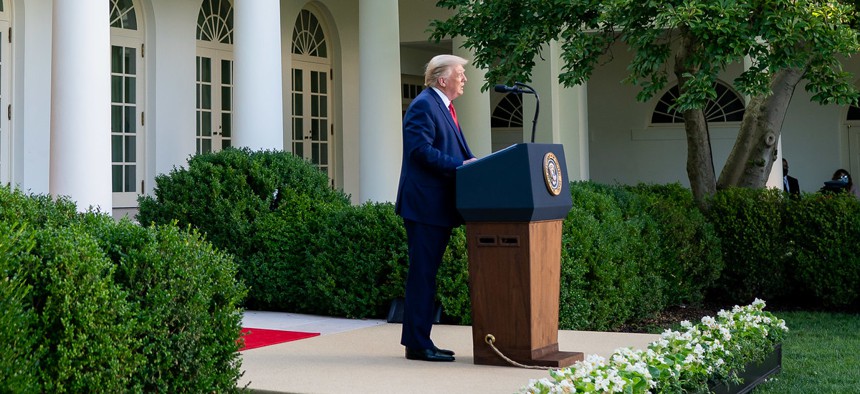
President Donald Trump during a press conference in the Rose Garden at the White House on July 14. Tia Dufour/White House
It’s Illegal for Federal Officials to Campaign on the Job. Trump Staffers Keep Doing It Anyway.
Trump administration officials have been cited 13 times for violating the Hatch Act, a New Deal-era law prohibiting government officials from engaging in campaigning.
President Donald Trump’s recent musings about staging his Republican National Convention speech at the White House drew criticism from government ethics watchdogs and even one Republican senator, John Thune of South Dakota.
The suggestion wasn’t an isolated blending of official presidential duties and the campaign. It was part of a yearslong pattern of disregarding such boundaries in the Trump White House. There is a law, called the Hatch Act, that prohibits most government officials from engaging in politicking in the course of their official work.
The law does not apply to the president or vice president. While other presidents took campaign advantage of the trappings of the office, something that came to be known as the “Rose Garden strategy,” they typically refrained from explicit electoral appeals or attacks on their opponents at official presidential events. Federal election law and measures governing appropriations prohibit using taxpayer dollars for electioneering.
Since resuming official travel at the beginning of May after a coronavirus-imposed pause, Trump has held 25 presidential out-of-town events. Of these events, transcribed on the official White House website, the president spoke about the election or attacked his opponent, Joe Biden, at 12 of them, nearly half. His presidential stage provided a venue for supporters to urge others to vote for Trump in November at three additional events.
Administration officials have been cited for breaking the Hatch Act 13 times by federal investigators at the Office of Special Counsel (not to be confused with special counsel Robert Mueller). Twelve more investigations are underway. The law dates from the New Deal era, enacted after a scandal where employees of the Works Progress Administration were pressured to work on the campaigns of candidates friendly to President Franklin D. Roosevelt.
Neither the White House, the campaign or Trump’s campaign treasurer, Bradley Crate, responded to requests for comment.
Kellyanne Conway, counselor to the president, violated the Hatch Act so many times that the OSC took the drastic measure of recommending she be fired, calling her actions “egregious, notorious and ongoing.” (Trump refused to do so.)
The special counsel, Henry Kerner, is a Trump appointee and member of the conservative Federalist Society. He previously worked for Republicans Darrell Issa and Jason Chaffetz on Capitol Hill.
When asked about the OSC’s recommendation, Conway said, “blah blah blah,” adding, “Let me know when the jail sentence starts.” Hatch Act violations are not criminal. The most significant result of a violation is dismissal.
Hatch Act violations were relatively rare in the previous two presidential administrations. Two cabinet officials were cited for Hatch Act violations during the eight years of Barack Obama’s presidency. Some half-dozen senior officials in the Obama and Bush administrations said that they were frequently advised to avoid even the appearance of electioneering at official events.
“There was a very bright line between what was a campaign event and what was an official event,” said Greg Jenkins, the director of advance for President George W. Bush during the period that included the 2004 reelection campaign. “If you could stretch things and say, yes, it’s perfectly legal to do this, but it has the appearance of impropriety — you don’t do it.”
Kathleen Sebelius, the former secretary of health and human services under Obama, was cited for making a statement urging his reelection during a gala for the Human Rights Campaign, an LGBTQ rights group. Sebelius apologized, and the Treasury was reimbursed for the cost of the trip.
“I’d prefer that it not be on my record,” Sebelius said in an interview from her home in Lawrence, Kansas. Given that she was on the Kansas ethics commission and was a national board member of Common Cause, “it’s kind of a black mark.” She added: “But I did what they say I did,” and said that “it puts into perspective what goes on every day in this current administration that just makes the top of my head come off.”
Previous campaigns have reimbursed taxpayers for costs associated with politicking while on official travel. And while disclosures do show that campaign committees associated with Trump have paid $896,000 to the Treasury and the White House Military Office in May and June, federal law doesn’t require an accounting of what those expenses were for.
Trump would not violate the Hatch Act if he chose the White House for his nomination acceptance speech, but executive branch employees in the White House and agencies might be in jeopardy if they support or attend the event, experts said.
“There are several laws that prohibit the use of federal funds and resources for partisan political events like the president’s RNC speech,” said Donald Sherman, deputy director of the watchdog group Citizens for Responsibility and Ethics in Washington, or CREW. “Trump’s predecessors scrupulously avoided mixing official conduct with politics in this way, but President Trump has routinely used the apparatus of the government to try to boost his electoral prospects.”
This article was originally published in ProPublica. It has been republished under the Creative Commons license. ProPublica is a Pulitzer Prize-winning investigative newsroom. Sign up for their newsletter.






